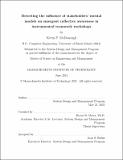| dc.description.abstract | The use of models to represent, investigate, and explain the world extends across disciplines, professions, and walks of life. From supporting learning in the classroom, to aiding organizational decision making, to influencing people’s daily lives by informing them about the weather, patterns of disease spread, and climate change, models pervade our lives. In Engineering, models provide a mechanism through which teams may organize, align, and share knowledge, communicate across role and domain of expertise, and develop new insights. Models enable stakeholders to learn and make more informed decisions in the face of complexity and uncertainty. While the value of models for representing complex sociotechnical systems-of-systems has been demonstrated, what is lesser well known is how a user’s knowledge and perceptions about the systems being represented mediate the use and efficacy of the models. This work explores one aspect of this phenomena ― how the diversity of a team’s mental models affects, and is affected by, their use of a system model. The design of a series of instrumented team experiments was developed and a teamwork research platform, using an agent based modeling and simulation framework, was created. A series of three instrumented teamwork workshops was conducted. Twelve teams participated in the workshops, role-playing as expert stakeholders, in the exploration of options for population, transportation, and function in site designs for a conceptual human settlement on Mars. A diversity in mental models distinguishable from postulated generative distributions was detected. This work demonstrates the use of instrumented methods to detect, quantify, and analyze mental models and tradespace exploration by users of a system model. | |
